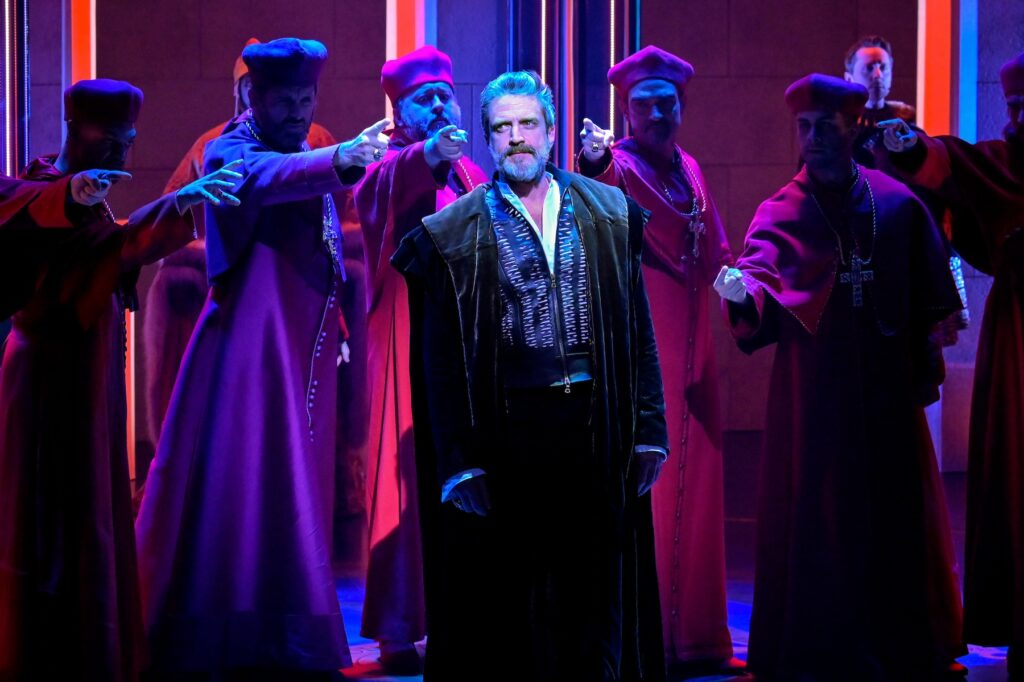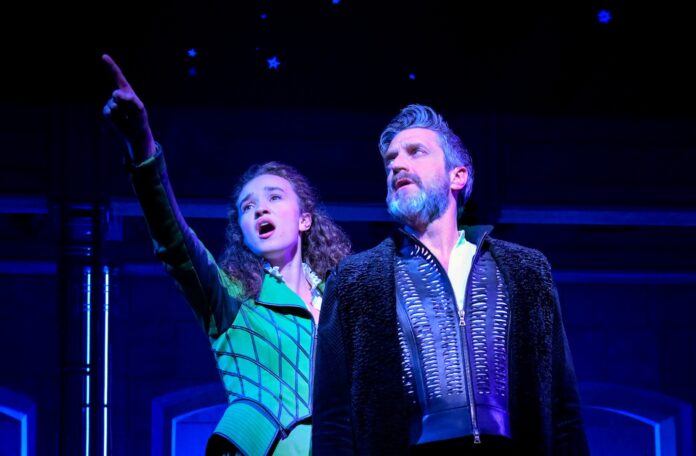Galileo (world premiere through June 23 at Berkeley Rep) is a new musical based on a book written by two-time Emmy winner Danny Strong, is directed by Tony Award winner Michael Mayer, and features an original score and lyrics by Michael Weiner and Zoe Sarnak, with choreography by Tony-nominated David Neumann. Four-time Tony nominee Raúl Esparza stars as the rebel astronomer, leading a cast of roughly 20 other actors—and this isn’t even mentioning the ace complement of designers and crew. If all of that is not enough, there is the essential live band led by keyboardist Sinha that includes a chamber’s-worth of stringed and other instruments.
It’s a galaxy of stars coming together to create a poignant tale of rebellion and societal upheaval in the midst of one of humanity’s greatest turning points. And it’s all propelled by a musical score that takes off from rock to explore a cosmos of other expressive sounds, as composers Sarnak and Wiener detailed in an interview with 48 Hills.
Sarnak started learning guitar and piano at age seven and was composing her own music within four years. She was raised in a Jewish household and graduated from college with a degree in molecular and cellular biology—something that makes her uniquely suited to taking on the Galileo task.
Growing up in the United States as the first generation American-born child of two immigrant Jews who were both academics shaped her foundations. “It informed the way I think of power, lack of power, knowledge and the pursuit of knowledge,” she said. “Being in a family that feels different from anyone around you, being from people of diaspora; you know you’re not in the hegemonic majority power structure.
“My parents raised me to be a spirited, academic thinker. My grandfather called me “Yeah but…,” because that’s what I’d always say. This subject, Galilieo, hits things I care about deeply. I think of math and science as creative fields, so I can delve into the psyche and mind of Galileo and his reaching into the cosmos and say it is like what we do as composers and musicians.”
Weiner grew up in Los Angeles under the shiny lights of Hollywood. His career path and early success—composing for Broadway, film and television, often with co-composer Alan Zachary—is attributable the artistic environment of his early years. “My parents introduce me very early on to film, theater, and music. When I was five years old, my father took me to David Lean movies like Lawrence of Arabia. The next weekend we’d see Camelot and My Fair Lady.”
“I grew up loving telling stories through music. I went to a Madonna concert when I was too young to go to a Madonna concert. What always excited me was the combination: using music to tell stories. From when I was 12, I started writing versions of musicals. Galileo drew me to its huge themes and everlasting stories: science versus art, truth versus power. I was raised under cultural Judaism, not religious. The Bible, I always thought of as a cool movie with incredible stories. Galileo started as a deeply religious man and by the end of life, was an atheist. That’s fascinating to me.”
Composing the musical, Sarnak and Weiner discovered they were united in one goal centered on a single question: “Why can’t science and religion coexist?” They aimed to give both science and religion equal weight and not indict one or the other. Essentially, the end result is Sarnak’s “yeah, but…” fused with Weiner’s storytelling curiosity.
And both have found a home in the rock musical form. Sarnak says she’s been writing pop and rock music her whole career. As a kid hearing RENT, she recognized music that “had a home” inside her. Rock invites audiences to feel what the characters feel and to respond with them to music that might throb with intense rhythm and texture, or come with gentle, beautiful melodies. “We think in rock and pop,” says Weiner.
Weiner says their first conversations jumped right to Galileo as a rebel, someone who’d smash a guitar onstage. The composers surround that figure with multiple sub-genres of music, from R&B and church music to classical, synth-pop, protest songs and more. “It’s music that speaks to us,” Weiner says. “An opera wouldn’t blow the roof off the theater in the way Galileo blew the roof off the Vatican. Rock does.”

Sarnak adds, “The beauty of aiming to write an evocative rock score is that you can be genius with four chords. You can be The Beatles and write ‘Let It Be.’ There’s nothing better. You have to use an emotional creativity to reach nuanced, profound, layered modern music.”
Working through each element, the duo explored how a synth sound could evoke soaring through the universe and tested if dance-pop beats would best express the teenage angst of Galileo’s daughter. “We wanted to avoid old-world churchy sounds, and instead wanted to create a musical vocabulary that didn’t make The Church leaders, for example, sound like mustache-twirling men. We wanted music that gets your blood swirling.”
The lyrics are distinct from the show’s dialogue in tone and articulation. The dialogue is more in a classic vein: sharp, witty comments illuminate technical, scientific terms. The lyrics are more relaxed, vernacular. “Heaven’s changin’” Galileo sings, and after a formal lecture to his students, “The moon’s roughed up. I feel her.”
Weiner says when a musical can bring all the elements of the theatrical package together, it’s magical. “Galileo’s story should connect with our minds and our hearts,” says Sarnak. “Music does that like nothing else. I hope people have feelings about it.”
GALILEO runs though June 23 at Berkeley Rep. More info here.






